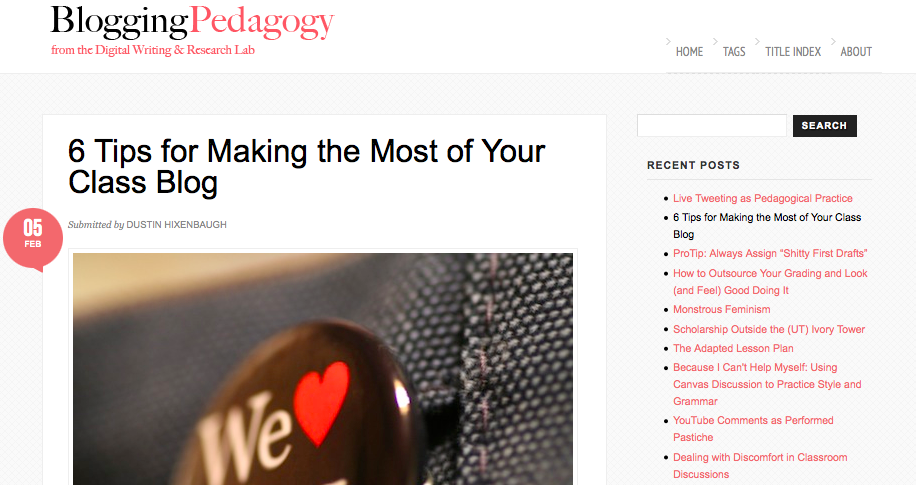Digital Dialog #1: “6 Tips for Making the Most of Your Class Blog”
Anybody who follows me on Facebook or Twitter has figured out that I get a little obsessed with the posts my students contribute to our “Rhetoric of Country Music” class blog. (Seriously, it’s one of my favorite things that I’ve had students do.) After sharing my students’ work on these social media platforms for a couple of months, I began receiving comments and private messages from other instructors at the University of Texas (not all of them associated with the DWRL) who said they were interested in setting up their own class blogs and wanted some advice. Figuring that these friends were probably not the only people looking for ways to help students practice digital composition, I decided to collect the tips I kept offering them on Blogging Pedagogy.
The post, which was published on February 5, 2015, can be divided into two parts. In the first, I draw my readers’ attention to posts that previous BP authors had written over the years regarding class blogs. I discovered that most of these authors either testify to the general merits of having students blog or offer suggestions for lesson plans integrating some form of blog writing. The instructors I had been communicating with already recognized the benefits of having students blog but were concerned about setting blogs up and fulfilling their responsibilities as the blogs’ administrators. So in the second part of my post I offer six practical ideas for getting students interested in the class blog and making the blog itself a central but not overly time-consuming component of the course. My recommendations range from staggering the deadlines to giving grades for students’ comments.
Since the post appeared in early February, after most instructors had begun their spring courses, it is hard to say whether or not its suggestions were immediately helpful. However, I have already referred one friend who is using a class blog for the first time to the post, and I am hopeful that other instructors will return to it when they begin planning for the fall. Personally, I found writing the post extremely valuable. Taking the time to reflect on my own strengths and weaknesses as a blog administrator has helped me deliver clearer and more effective instructions to my students this semester.
Digital Dialog #2: “Honky Tonkin'” Podcast
In the 2014-2015 school year, I have served as a contributor and Project (Co)Leader to the DWRL’s podcast series, Zeugma. “Honky Tonkin’,” released in February 2015, is the second episode that I have produced myself. Carrying out Zeugma‘s mission to explore the intersections between rhetoric and technology, the episode approaches the honky tonk as the deliberately anachronistic home to a local community standing (and two-stepping) in opposition to the city of Austin’s modernization and commercialization. As I argue, country music and the juke box are two of the channels by which the community conveys its oppositional perspective.
Zeugma is an appropriate venue for this “dialog” for two reasons. First, the series’ listeners hail primarily from Austin, and the episode reflects the current team’s commitment to featuring local sites and perspectives. I am proud that it features an extended interview with the local author Christine J. Warren (Honky Tonk Debutante: The History of Honky-Tonk Music as I Care to Tell It, Bottle Shock, 2014) that I recorded at the historic Cactus Café. Second, like the previous episode I produced (“Standing at the Corner”), “Honky Tonkin'” is a joint venture that I would not have been able to complete without the creative and technical contributions of Warren and my fellow Zeugma members. The podcast, which is attributed to a team whose members shuffle every year, seems a better match for this kind of collaborative scholarship than, say, an article in an online journal.
In the first 24 hours after it was published, “Honky Tonkin'” was downloaded 30+ times and is likely to become one of the season’s most popular episodes. It also brought Zeugma‘s Facebook page new likes from places like Nashville. Of course, I would like to think its impact extends past its number of downloads. I added a link to it from my “Rhetoric of Country Music” class blog and expect that some students will incorporate excerpts from the Warren interview in their upcoming research projects. Additionally, I hope the episode’s focus on the forms by which the Austin community expresses itself is reinforced in upcoming Zeugma episodes on food trucks, fundraising, and other facets of daily living in Austin. Finally, I am glad for the opportunity recording the episode provided me to develop a constructive professional relationship with a local author that I admire.
